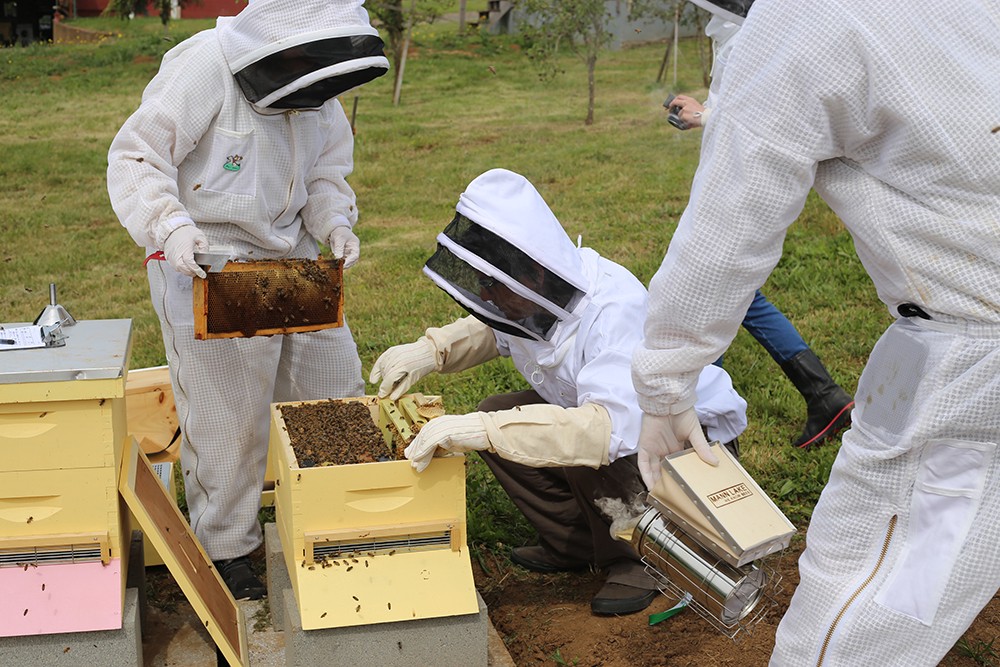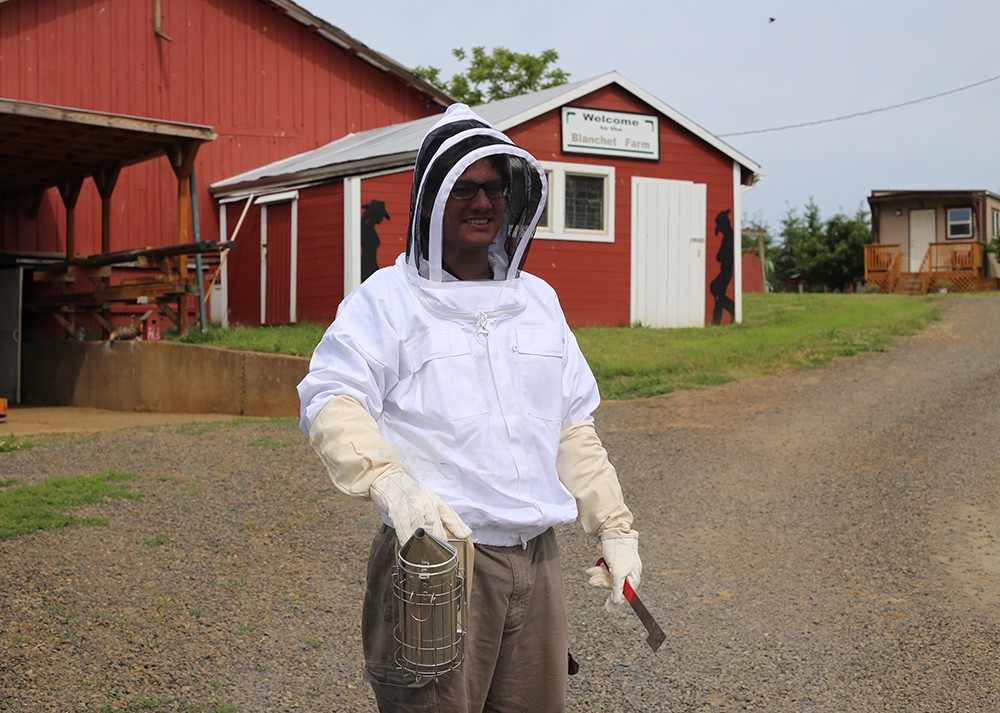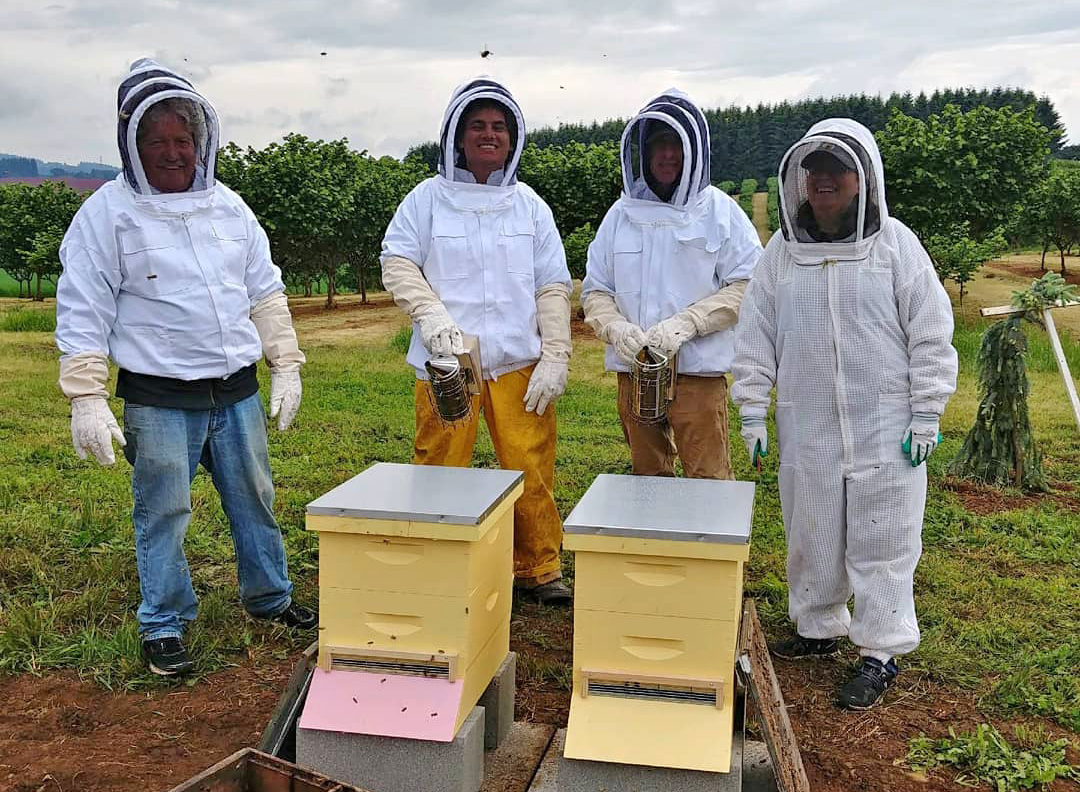
Katy Fackler teaches beekeeping to residents of Blanchet Farm in Carlton, Oregon. Photo by Julie Showers.
Therapeutic Beekeeping For Addiction Recovery and Mental Health
Bees bring hope and healing to men in recovery at Blanchet Farm–and the environment too.
Suited up in head-to-toe protective gear, beekeeper Katy Fackler slowly pulls a churning mass of buzzing bees from a box as her students watch. Fackler volunteers to teach beekeeping at Blanchet Farm, a rustic addiction recovery program for men operated by Blanchet House.
Up to 22 men stay at the farm for 8–12 months free of charge. Those who’ve found their way there have usually tried many traditional rehab programs and are desperate for something different to help gain sobriety. The therapeutic beekeeping program could give someone just what they need to heal.
“Learning new skills, being present in nature, and doing meaningful work are core reset and recovery tools for all of us,” says Fackler, a second-generation beekeeper, and financial analyst.
Today’s installation of four yellow wood bee boxes along with living bees and their queens has been months in the making. The COVID-19 pandemic slowed things down.
Beekeeping Helps Rebuild Soft Job Skills
The goal of the beekeeping program is to offer a meaningful activity that can help build soft job skills and regain self-worth. Many of the farm’s residents have strained employment and family histories because of their substance abuse. Some have struggled with untreated mental illness. They have lost faith in themselves and need a safe place with peer support to try again.
“Taking care of something helps the guys,” says Ross Sears, Blanchet Farm’s long-time manager who is also in recovery. “It takes away from just thinking about themselves. It teaches empathy and sympathy. Caring for any animal does.”

Jordan S., a beekeeper in training, holds a smoker at Blanchet Farm. Photo by Julie Showers.
In addition to the new bees, the farm keeps pigs, goats, chickens, ducks, dogs, and cats. The first chore a resident is assigned to is usually caring for the five enormous pigs. The friendly but aggressive animals help ease the men’s anxiety about coming to live on the farm. A man is able to show and receive love to the animals without fear of judgment.
Fackler will work with a few farm residents at least once a month, if not more during the summer. They will learn beekeeping basics and learn to identify signs of pests and diseases. She learned the art and science of beekeeping from her father growing up in eastern Oregon. He keeps an apiary at their family home on the coast.
“The location of this apiary is unique in that it’s only 100 feet from the ocean and very close to a large botanical garden,” she says. “The honey produced is amazing! It has a slight saltiness that makes it very special.”
Beekeeping Builds Confidence
Fackler’s jubilant passion for bees is infectious. Her positive and gentle demeanor helps to boost the novice beekeepers’ confidence. She explained to the group that the bees will begin making honey almost as soon as they are hived. But it will be about a year before honey is able to be taken off the hives for human use. Depending on how robust the hives are, most of the honey will need to be left for the bees to use over the winter. She is excited to see how well the bees do living on the farm.

Left to right: Ron, Jordan, an anonymous guest, and Katy Fackler pose next to the hives they installed at Blanchet Farm. Photo courtesy of Blanchet House.
“I’m very glad we kept going on this project despite the pandemic. Faith in the future and for better times is the only way we are getting past this,” Fackler says. “For me, [the delivery of the hives] feels like a celebration after months of planning. I am so excited to finally get to the fun part of the project.”
Moreover, there is a growing body of research that shows the benefits of beekeeping to people’s mental health. Veterans with PTSD were found to have reduced levels of stress, anxiety, and depression after spending time beekeeping according to doctors at Manchester VA Medical Center in New Hampshire.
Beekeeping Program Aids Men in Addiction Recovery
Guys at the farm, like Jordan S., are eager to learn the art of beekeeping. He suited up and jumped right in beside Fackler to successfully set up the hives. Jordan arrived at the farm a few months ago after being homeless on the streets of Portland because of unmedicated mental illness and substance abuse.
“This is the longest I’ve been sober,” Jordan said. “I’m learning so much from Katy. It’s really therapeutic working with the animals too. They get to know you. You build a relationship. You talk to them.”
The bees will now get acclimated to their new homes while investigating the flower and vegetable gardens. Sears says he looks forward to the benefits the bees will bring the men of Blanchet Farm as well as to the crops on the farm.
“The more bees the healthier everything will be,” Sears says.














